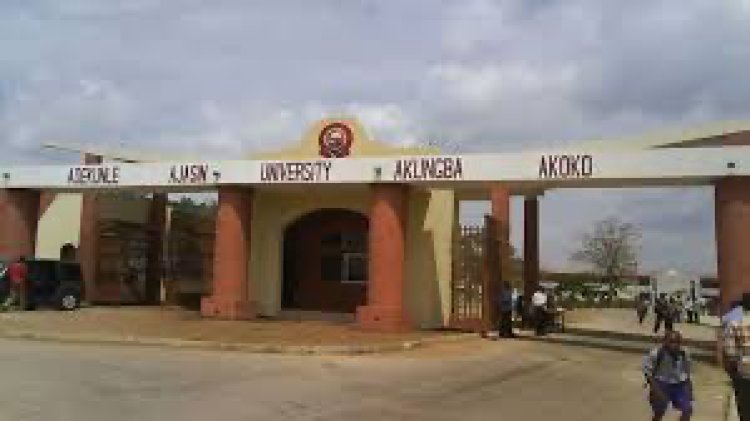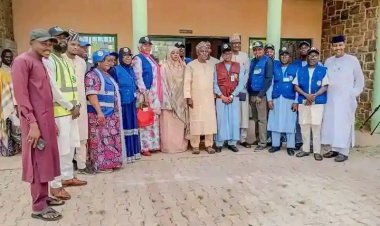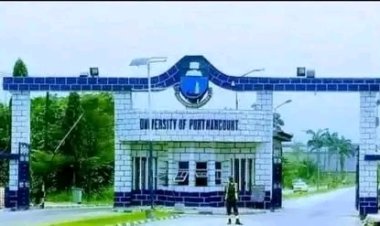AAUA Don Raises Alarm Over Food Insecurity in Nigeria, Proffers Solutions
A professor of Economics in the Department of Economics, Adekunle Ajasin University, Akungba-Akoko (AAUA), Prof. Sola Olorunfemi has raised alarm over looming food insecurity in the country And also preferring solutions to be immediately implemented.

A professor of Economics in the Department of Economics, Adekunle Ajasin University, Akungba-Akoko (AAUA), Prof. Sola Olorunfemi has raised alarm over looming food insecurity in the country, cautioning that the current food security in the nation is precarious and needed to be tackled without delay. He suggests that governments should come up with policies that would encourage and enhance local food production.

Professor Olorunfemi dropped the warning on Tuesday while delivering the 21st inaugural lecture of the university entitled: “Fragilities of Food Security Amidst Macroeconomic Issues: A Ticking Time Bomb!”
Read Also: AAUA Alumni Association Set to Hold Biennial General Assembly's
Calling on government at all levels to take immediate action to avert the looming time bomb from going off, Prof. Olorunfemi said there’s need for the Federal and state government to act earnestly.
Proferring solutions to the looming food Insecurity, the don recommended that governments should come up with policies that would encourage and enhance local food production with a view to ensuring stability in both production and supply.
He also called on governments to allocate additional arable land for farming purposes to support increased agricultural activities, also suggesting increase in financial allocation to the agriculture sector to strengthen research and extension services as well as upward review of household incomes to make them less prone to food insecurity.
Emphasising on how to check the vulnerability of food situation in the country, Prof. Olorunfemi noted that enlightening the people on nutritional requirements is important. He also emphasised on implementation of politicies that would reduce food cost, particularly on vocational training to improve skills and income-earning opportunities, and proper planning of households.
Related: AAUA Convocates 42 First-Class, Best Graduating student
Furthermore, the Professor of Economics highlighted the significance of population control policies, reduction in family size, attention to the dependent age group, social services policies for easy accessibility, stable macroeconomic policies, and microeconomic policies designed for increased food production and economic access to food.
He warned: “The fragilities of food security are seriously with us. The food situation in Nigeria is so fragile; delicate and unlikely to be able to resist strong pressure or attack if care is not taken. Therefore, to avoid the imminent time bomb, the federal and state governments ought to heed available warnings and implement solutions to the impending threat of food shortage.
“Increased food supply and food availability enhance stability in both food production and supply. Local production of foods that are of low availability in the country should be encouraged. More arable land should be allotted for farming purposes; and enabling conditions should be provided as incentives for more participatory engagement in the agricultural sector.
“More funding should be allocated to the agricultural sector, while there is need to strengthen alternative financing such as agricultural insurance schemes, farmers cooperatives etc. The more income a household earns, the less prone to food insecurity the household tends to become. Therefore, effort must be made to prioritise more income generating opportunities for the people.
“Food prices are also essential determinants of food security. Food prices seem to be rising faster than the income of households. As a result of inadequate purchasing power, the poor households may not have access to food. Since the government does not exercise control over food prices, and given the lack of formal safety net, it is recommended that it is important to design and implement policies that will eventually reduce the cost of food.”
Nevertheless, the inaugural lecturer said: “The development of infrastructures in rural areas was parallel to agricultural development, adding that facilities such as good feeder roads will enhance evacuation of output and transportation of inputs to the rural areas.
“In particular, on-farm storage facilities are appropriate for specific agricultural enterprises. Such storage structures should be designed and commercialized for use in rural areas.”
The Vice Chancellor of the institution, Prof. Olugbenga Ige in his remarks, said apart from being a momentous academic ceremony, marking the celebration of an academic staff member’s appointment to professorship, Inaugural Lecture served as a platform to share accomplishments in research, innovations, engagements, and teaching with the University community and the wider public.

 Nnenna Orji
Nnenna Orji 



